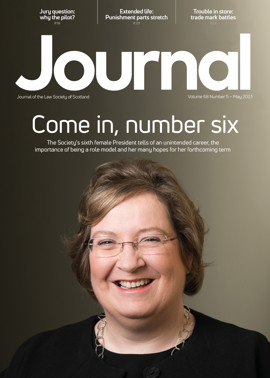Tribunal aims for efficient justice

New draft rules for the Scottish Solicitors’ Discipline Tribunal have been published by the tribunal for consultation.
Its current rules date from 2008 and the tribunal believes they are no longer fit for purpose. Some procedures commonly adopted have no provision in the rules. Other rules are ambiguous and have been subject to different interpretations by parties. There are no procedures for some issues which are commonly encountered. Modern technology may be able to provide some solutions, as became clear during the Covid-19 pandemic when much of the tribunal’s business moved online.
An initial consultation took place in 2019 on the issues that ought to be addressed, but the draft rules contain more comprehensive changes, with the overall aim of assisting the expeditious disposal of business and avoiding unnecessary hearings, while maintaining the tribunal’s independence, impartiality and transparency and the principles of natural justice. The rules are also intended to be user friendly and expressed in plain English.
One inclusion in the new draft is the standard of proof in misconduct cases, which the tribunal recently decided should remain at the criminal standard of beyond reasonable doubt. While this will be kept under review, the tribunal believes it is not yet time to revisit the issue. Although the Law Society of Scotland took the view that an evidential burden had no place in procedural rules, most respondents were in favour of its inclusion and the tribunal does not believe it would be difficult to change this particular rule if that were felt appropriate in future.
Another new inclusion is a statement of overriding objective – “to deal with cases fairly, justly and efficiently, always in accordance with the law and the rules of natural justice”.
The tribunal intends to keep its system of complaint and answers based on the civil pleadings system, but with more guidance in the forms as to what is required in pleadings. As was supported by all respondents, there is significant new provision for case management, including by the chair and vice chairs without a full tribunal.
Electronic service, digital or scanned signatures and remote hearings are all provided for. If service by other means has failed, “deemed service” may be effected by giving notice in the Journal and/or the tribunal’s website.
Another innovation is specific provision for compensation hearings, which can take place on the day of the misconduct hearing or at a later date, or on the papers in appropriate cases. (Note however that under the Regulation of Legal Services (Scotland) Bill as introduced, the tribunal will lose the power to award compensation in misconduct cases.)
There is extended provision for affidavit evidence, and a power to direct that a witness be treated as vulnerable, with special measures available. Criminal convictions will be provable by the production of an extract.
A further new rule will apply where a question arises as to the ability of a party to participate in and/or attend a hearing by reason of mental disorder. Questions of capacity as a defence will be dealt with on the evidence in the usual way (including use of new draft rule 17 on expert evidence if necessary).
Numerous miscellaneous changes are proposed. These are set out in the consultation by noting the current and the proposed new rule, and a brief explanation of the changes.
A separate and parallel consultation covers the scale of expenses where an award is made. In a 2021 consultation the tribunal proposed to continue awarding expenses on the agent and client, client paying scale, subject to its discretion to use a different basis, but following concerns raised by the Lord President that this might not be proportionate, and consideration of other responses, the Tribunal proposes that in general it uses the party and party scale. This is a significant alteration to its general practice and before implementing such a decision the tribunal therefore wishes to seek views, including on the financial implications of the change and the broader impact on the profession at large.
Both consultations can be accessed on the SSDT website. The closing date for responses is 5pm on 1 June 2023.
Perspectives
Features
Briefings
- Civil court: Spotlight on the Sheriff Appeal Court
- Employment: Must do better – the s 23 approach
- Human rights: Crime, detention and mental health issues
- Pensions: A question of tax
- Scottish Solicitors' Discipline Tribunal: May 2023
- Family: The slide rule of grave risk
- In-house: A route to diversity






